- Home
- Robin Hobb
The Inheritance and Other Stories Page 9
The Inheritance and Other Stories Read online
Page 9
In the next three weeks, I passed out twenty-seven copies of my résumé to various bored people at desks. I interviewed for two jobs that were just as low paying as the one I already had. I found a fantastic job that would have loved to hire me, but its funding called for it to be given to a displaced homemaker or a disadvantaged worker. Then I called on a telemarketer telephone interviewing position ad in the paper. They liked my voice and asked me to come in. After a lot of pussyfooting, it turned out to be a job where you answered toll calls from heavy breathers and conversed animatedly about their sexual fantasies. “Sort of an improvisational theater of the erotic,” said my interviewer. She had some tapes of some sample calls, and I found myself listening to them and admitting, yes, it sounded easy. Best of all, the interviewer told me, I could work from my own home, doing the dishes or sorting laundry while telling some man how much I’d like to run a warm sponge over his body, slathering every nook and cranny of his flesh with soapsuds until he gleamed, and then, when he was hard and warm and wet, I’d take him and . . . for six to seven dollars an hour. They even had pamphlets that explained sexual practices I might not be familiar with and gave the correct jargon to use when chatting about them. Six to seven dollars an hour. I told the interviewer I’d have to think about it and went home.
And got up the next day and defrosted the refrigerator again and swept the carpet in the living room because I was out of vacuum bags. Then I did all the mending that I had been putting off for weeks, scrubbed the landing outside my apartment door and sprayed it with Cat-B-Gon, and thought about talking on the telephone to men about sex, and how I could do it while I was ironing a shirt or arranging flowers in a vase or wiping cat turds off my shoe. Then I took a shower and changed and went in to work at Sears for the five-to-nine evening shift. I told myself that the work wasn’t dirty or extremely difficult, that my coworkers were pleasant people, and that there was no reason why this job should make me so depressed.
It didn’t help.
The mall was having Craft Week, and to get to Sears I had to pass all the tables and people. I wondered why I didn’t get busy and make things in the evenings and sell them on the weekends and make ends meet that way. I passed Barbie dolls whose pink crocheted skirts concealed spare rolls of toilet paper, and I saw wooden key chains that spelled out names, and ceramic butterfly wind chimes, and a booth of rubber stamps, and a booth with clusters of little pewter and crystal sculptures displayed on tables made of old doors set across sawhorses. I slowed a little as I passed that one, for I’ve always had a weakness for pewter. There were the standard dragons and wizards, and some thunder-eggs cut in half with wizard figures standing inside them. There were birds, too, eagles and falcons and owls of pewter, and one really nice stag almost as big as my hand. For fifty-two dollars. I was looking at it when I heard a woman standing behind me say, “I’d like the crystal holding the wizard, please.”
And the owner of the stall smiled at her and said, “You mean the wizard holding the crystal, right?” and the woman said, in this really snotty voice, “Quite.”
So the owner wrapped up the little figurine of a wizard holding a crystal ball in several layers of tissue paper and held it out to the woman and said, “Seventeen seventy-eight, please,” and the woman was digging in her purse and I swear, all I did was try to step out of their way.
I guess my coat caught on a corner of the door or something, for in the next instant everything was tilting and sliding. I tried to catch the edge of the door-table, but it landed on the woman’s foot, really hard, as all the crystal and pewter crashed to the floor and scattered across the linoleum like a shattered whitecap. The woman screamed and threw up her hands, and the little wrapped wizard went flying.
I’m not sure if I really saw this.
The crystal ball flew out of the package and landed separately on the floor. It didn’t shatter or tinkle or crash. It went Poof! with a minute puff of smoke. And the crumple of tissue paper floated down emptily.
“You stupid bitch!” the woman yelled at me, and the owner of the booth glared at me and said, “I hope to hell you have insurance, klutz!”
Which is a dumb thing to say, really, and I couldn’t think of any answer. People were turning to stare, and moving toward us to see what the excitement was, and the woman had sort of collapsed and was holding on to her foot, saying, “My God, it’s broken, it’s broken.”
I knew, quite abruptly and coldly, that she wasn’t talking about her foot.
Then the fortyish man grabbed me by the elbow and said, “We’ve got to get out of here!” I let him pull me away, and the funny thing is, no one tried to stop us or chase us or anything. The crowd closed up around the woman on the floor like an amoeba engulfing a tidbit.
Then we were in a pickup truck that smelled like a wet dog, and the floor was cluttered with muddy newspapers and Styrofoam coffee cups and wrappers from Hostess Fruit Pies and paper boats from the textured vegetable protein burritos they sell in the 7-Eleven stores. Part of me was saying that I was crazy to be driving off with this guy I hardly knew who had stuck me with the bill for dinner, and part of me was saying that I had better get back to Sears, maybe I could explain being this late for work. And part of me just didn’t give a shit anymore; it just wanted to flee. And that part felt better than it had in ages.
We pulled up outside a little white house and he turned to me gravely and said, “Thank you for rescuing me.”
“This is really dumb,” I said, and he said, “Maybe so, but it’s all we’ve got. I told you, magic isn’t what it used to be.”
So we went inside the little house and he put the tea kettle on. It was a beautiful kettle, shining copper with a white-and-blue ceramic handle, and the cups and saucers he took down matched it. I said, “You stuck me with the bill at the restaurant.”
He said, “My enemies fell upon me in the restroom and magicked me away. I told you. I never would have chosen to leave you that way, Silver Lady. But for your intervention I would still be in their powers.” Then he turned, holding a little tin canister in each hand and asked, “Which will you have: Misplaced Dreams or Forgotten Sweetness?”
“Forgotten Sweetness,” I said, and he put down both canisters of tea and took me in his arms and kissed me. And yes, I could feel his stomach sticking out a little against mine, and when I put my hand to the back of his head to hold his mouth against mine, I could tell his hair was thinning. But I thought I could hear wind chimes and scent an elusive perfume on a warm breeze.
I don’t believe in magic. The idea of willing magic into my life is dumb. Dumb. But as the fortyish man had said, it was all we had. A dumb hope for a small slice of magic, no matter how thin. The fortyish man didn’t waste his energy carrying me to the bedroom.
I never met a man under twenty-five who was worth the powder to blow him to hell. They’re all stuck in third gear.
It takes a man until he’s thirty to understand what gentleness is about, and a few years past that to realize that a woman touches a man as she would like him to touch her.
By thirty-five, they start to grasp how a woman’s body is wired. They quit trying to kick-start us and learn to make sure the battery is charged before turning the key. A few, I’ve heard, learn how to let a woman make love to them.
Fortyish men understand pacing. They know it doesn’t have to all happen at once, that separating each stimulus can intensify each touch. They know when pausing is more poignant than continuing, and they know when continuing is more important than a ceramic kettle whistling itself dry on an electric burner.
And afterward I said to him, “Have you ever heard of ‘Lindholm’s Rule of Ten’?”
He frowned for an instant. “Isn’t that the theory that the first ten times two people make love, one will do something that isn’t in sync with the other?”
“That’s the one,” I said.
“It’s been disproved,” he said solemnly. And he got up and went to the bathroom while I rescued the smoking kettle fr
om the burner.
I stood in the kitchen, and after a while I started shivering, because the place wasn’t all that well heated. Putting my clothes back on didn’t seem polite somehow, so I called through the bathroom door, “Shall I put on more water for tea?”
He didn’t answer, and I didn’t want to yell through the door again, so I picked up my blouse and slung it around my shoulders and shivered for a while. I sort of paced through his kitchen and living room. I found myself reading the titles of his books, one of the best ways to politely spy on someone. Theories of Thermodynamics was right next to The Silmarillion. All the books by Carlos Castenada were set apart on a shelf by themselves. His set of Kipling was bound in red leather. My ass was freezing, and I suspected I had a rug burn on my back. To hell with being polite. I went and got my underwear and skirt and stood in the kitchen, putting them on.
“Merlin?” I called questioningly as I picked up my pantyhose. They were shot, a huge laddered run up the back of one leg. I bunched them up and shoved them into my purse. I went and knocked on the bathroom door, saying, “I’m coming in, okay?” And when he didn’t answer, I opened the door. There was no one in there. But I was sure that was where he had gone, and the only other exit from the bathroom was a small window with three pots of impatiens blooming on the sill. The only clue that he had been there was the used rubber floating pathetically in the toilet. There is nothing less romantic than a used rubber.
I went and opened the bedroom door and looked in there. He hadn’t made his bed this morning. I backed out.
I actually waited around for a while, pretending he would come back. I mean, his clothes were still in a heap on the floor. How he could have gotten redressed and left the house without my noticing it, I didn’t try to figure out. But after about an hour or so, it didn’t matter how he had done anything. He was gone.
I didn’t cry. I had been too stupid to allow myself to cry. None of this made sense, but my behavior made the least sense of all. I finished getting dressed and looked at myself in the bathroom mirror. Great. Smeared makeup and nothing to repair it with, so I washed it all off. Let the lines at the corners of my mouth and the circles under my eyes show. Who cared? My hair had gone wild. My legs were white fleshed and goosebumpy without the pantyhose. The cute little ankle-strap heels on my bare feet looked grotesque. All of me looked rumpled and used. It matched how I felt, an outfit that perfectly complemented my mood, so I got my purse and left.
The old pickup was still outside. That didn’t make sense either, but I didn’t really give a damn.
I walked home. That sounds simpler than it was. The weather was raw, I was barelegged and in heels, it was getting dark, and people stared at me. It took me about an hour, and by the time I got there I had rubbed a huge blister on the back of one of my feet, so I was limping as well. I went up the stairs, narrowly missing the moist brown pile the neighbor’s cat had left for me, unlocked my apartment door and went in.
And I still didn’t cry. I kicked off my shoes and got into my old baggy sweat suit and went to the kitchen. I made myself hot chocolate in a little china pot with forget-me-nots on it, and opened the eight-ounce canned genuine all-the-way-from-England Cross & Blackwell plum pudding that my sister had given me last Christmas and I had saved in case of disasters like this. I cut the whole thing up and arranged it on a bone china plate on a little tray with my pot of hot chocolate and a cup and saucer. I set it on a little table by my battered easy chair, put a quilt on the chair, and got down my old leather copy of Dumas’s The Three Musketeers. Then I headed for the bathroom, intending to take a quick hot shower and dab on some rose oil before settling down for the evening. It was my way of apologizing to myself for hurting myself this badly.
I opened the bathroom door, and a stench cloud of sulfurous green smoke wafted out. Choking and gasping, I peered in, and there was the fortyish man, clad only in a towel, smiling at me apologetically. He looked apprehensive. He had a big raw scrape on one knee, and a swollen lump on his forehead. He said, “Silver Lady, I never would have left you like that, but . . .”
“You were teleported away by your archrival,” I finished.
He said, “No, not teleported, exactly; this involved a spell requiring a monkey’s paw and a dozen nightshade berries. But they were last year’s berries, and not potent enough to hold me. I had a spell of my own up my sleeve and . . .”
“You blasted him to kingdom come,” I guessed.
“No.” He looked a little abashed. “Actually, it was the ‘Incessant Rectal Itch’ spell, a little crude, but always effective and simple to use. I doubt that he’ll be bothering us again.” He paused, then added, “As I’ve told you, magic isn’t what it used to be.” Then he sniffed a few times and said, “Actually, I’ve found that Pine-Sol is the best stuff for getting rid of spell residues . . .”
So we cleaned up the bathroom. I poured hydrogen peroxide over his scraped knee and he made gasping noises and swore in a language I’d never heard before. I left him doing that and went into the kitchen and began reheating the hot chocolate. A few moments later he came out dressed in a sort of sarong he’d made from one of my bedsheets. It looked strangely elegant on him, and the funny thing was, neither of us seemed to feel awkward as we sat down and drank the hot chocolate and shared the plum pudding. The last piece of plum pudding he took, and borrowing some cream cheese from my refrigerator, he buttered a cabalistic sign onto it.
Then he went to the door and called, “Here, kitty, kitty, kitty.”
The neighbor’s cat came at once, and the ratty old thing let the fortyish man scoop him up and bring him into my living room, where he removed two ticks from behind its ears and then fed it the plum pudding in small bites. When he had done that, he picked it up and stared long into its yellowish eyes before he intoned, “By bread and cream I bind you. Nevermore shalt thou shit upon the threshold of this abode.” Then he put the cat gently out the door, observing aloud, “Well, that takes care of the curse you were under.”
I stared at him. “I thought my curse had something to do with me working at Sears.”
“No. That was just a viciously cruel thing you were doing to yourself, for reasons I will never understand.” He must have seen the look on my face, because after a while he said, “I told you, the magic is never quite what you think it to be.”
Then he came to sit on the floor beside my easy chair. He put his elbow on my knee and leaned his chin in his hand. “What if I were to tell you, Silver Lady, that I myself have no real magic at all? That, actually, I climbed out my bathroom window and sneaked through the streets in my towel to meet you here? Because I wanted you to see me as special?”
I didn’t say anything.
“What if I told you I really work for Boeing, in Personnel?”
I just looked at him, and he lifted his elbow from my knee and turned aside a little. He glanced at his own bare feet, and then over at my machine. He licked his lips and spoke softly. “I could get you a job there. As a word processor, at about eleven dollars an hour.”
“Merlin,” I said warningly.
“Well, maybe not eleven dollars an hour to start . . .”
I reached out and brushed what hair he had back from his receding hairline. He looked up at me and then smiled the smile where he always looked aside from me. We didn’t say anything at all. I took his hand and led him to my room, where we once more disproved Lindholm’s Rule of Ten. I fell asleep curled around him, my hand resting comfortably on the curve of his belly. He was incredibly warm and smelled of oranges, cloves, and cinnamon. Misplaced Dreams tea, that’s what he smelled like.
And that night I dreamed I wore a peacock feather gown and strolled through a misty garden. I had found something I had lost, and I carried it in my hand, but every time I tried to look at it to see what it was, the mist swirled up and hid my hand from me.
In the morning when I woke up, the fortyish man was gone.
It didn’t really bother me. I knew that either he woul
d be back or he wouldn’t, but either way no one could take from me what I already had, and what I already had was a lot more magic than most people get in their lives. I put on my ratty old bathrobe and my silver ladies and went out into the living room. His sarong sheet was folded up on the easy chair in the living room and the neighbor’s cat was asleep on it, his paws tucked under his chin.
And my Muse was there, too, perched on the corner of my desk, one knee under her chin as she painted her toenails. She looked up when I came in and said, “If you’re quite finished having a temper tantrum, we’ll get on with your career now.”
So I sat down at my machine and flicked the switch on and put my fingers on the home row.
Funny thing. The keys weren’t even dusty.
Cut
And here is yet another of my stories that gets a bit too close to the bone.
Some stories, I feel, are written because the writer has a point to make. The writer knows something, or thinks he or she knows something, and intends to inflict that knowledge on the reader. At their worst, those stories turn into polemics or badly disguised fables with the moral shouting at the reader from the final paragraph.
I hope and pray that I do not do that.
Rather, I like to think (and please don’t disabuse me of this notion!) that I write stories because I have a question. Not the answer, mind you, but just the question. The question at the core of this story is, Who owns the body? Is my body my own, to modify with tattoos and piercings? May I color my hair or shave it off, enlarge my breasts, or starve myself into bony submission?
And if the answers to all those questions is, Yes, you may, then at what point is society allowed to interfere with what I do? At what point do those decisions belong solely to me? When I am twenty-one or when I am twelve? May I make those sorts of decisions for my child, for religious or aesthetic reasons? Now we are on shakier ground, are we not? Do you immunize your child, straighten his teeth, correct a club foot, radiate his cancer, and circumcise him?

 Ship of Destiny
Ship of Destiny Golden Fool
Golden Fool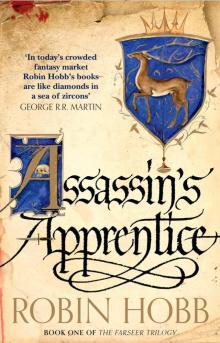 Assassins Apprentice
Assassins Apprentice The Dragon Keeper
The Dragon Keeper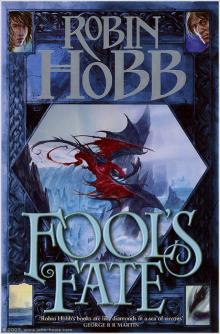 Fools Fate
Fools Fate Fools Errand
Fools Errand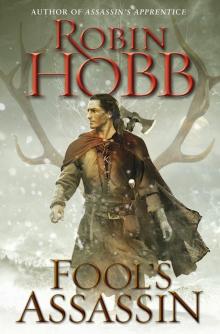 Fools Assassin
Fools Assassin The Mad Ship
The Mad Ship Shamans Crossing
Shamans Crossing Ship of Magic
Ship of Magic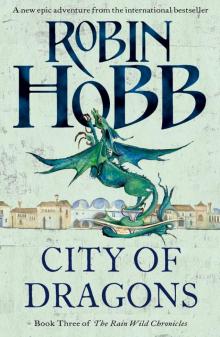 City of Dragons
City of Dragons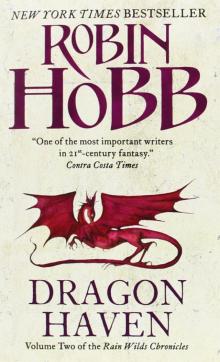 Dragon Haven
Dragon Haven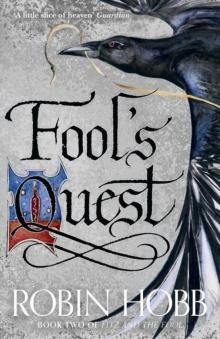 Fools Quest
Fools Quest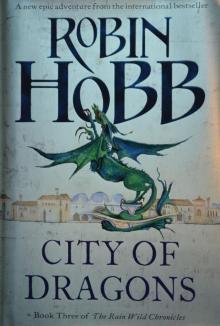 Blood of Dragons
Blood of Dragons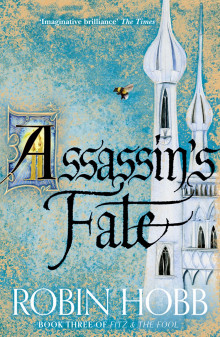 Assassin's Fate
Assassin's Fate Assassins Quest
Assassins Quest Renegades Magic
Renegades Magic Forest Mage
Forest Mage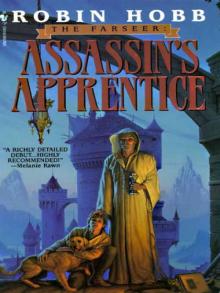 Assassin's Apprentice tft-1
Assassin's Apprentice tft-1 Assassin's Quest tft-3
Assassin's Quest tft-3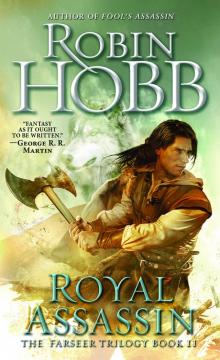 Royal Assassin
Royal Assassin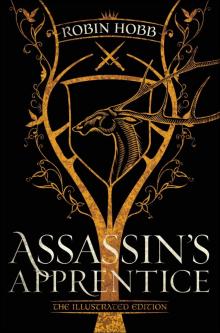 Assassin's Apprentice (The Illustrated Edition)
Assassin's Apprentice (The Illustrated Edition) Assassin's Quest (UK)
Assassin's Quest (UK) Royal Assassin (UK)
Royal Assassin (UK)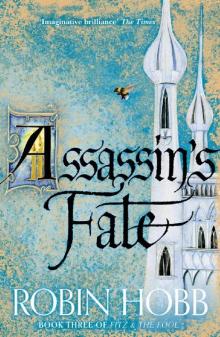 FF3 Assassin’s Fate
FF3 Assassin’s Fate Royal Assassin tft-2
Royal Assassin tft-2 Fool’s Assassin: Book One of the Fitz and the Fool Trilogy
Fool’s Assassin: Book One of the Fitz and the Fool Trilogy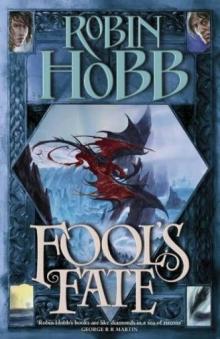 Fool's Fate ttm-3
Fool's Fate ttm-3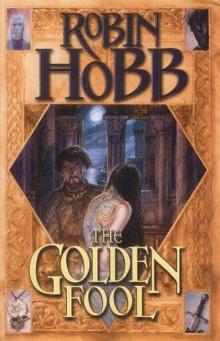 The Golden Fool ttm-2
The Golden Fool ttm-2 The Liveship Traders Series
The Liveship Traders Series The Wilful Princess and the Piebald Prince
The Wilful Princess and the Piebald Prince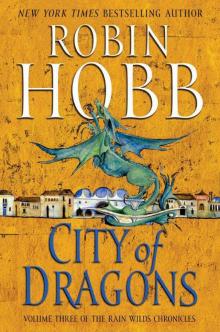 City of Dragons rwc-3
City of Dragons rwc-3 The Tawny Man 1 - Fool's Errand
The Tawny Man 1 - Fool's Errand Words Like Coins
Words Like Coins The Complete Tawny Man Trilogy Omnibus
The Complete Tawny Man Trilogy Omnibus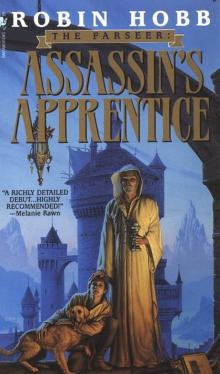 Farseer 1 - Assassin's Apprentice
Farseer 1 - Assassin's Apprentice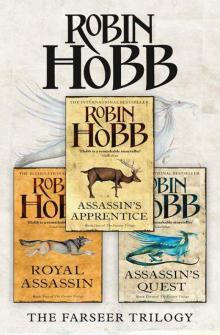 The Complete Farseer Trilogy Omnibus
The Complete Farseer Trilogy Omnibus The Soldier Son Trilogy Bundle
The Soldier Son Trilogy Bundle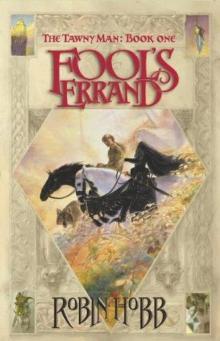 Fool's Errand ttm-1
Fool's Errand ttm-1 Blue Boots
Blue Boots Shaman's Crossing ss-1
Shaman's Crossing ss-1 Mad Ship
Mad Ship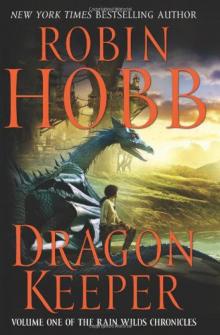 Dragon Keeper
Dragon Keeper The Willful Princess and the Piebald Prince
The Willful Princess and the Piebald Prince Ship of Destiny tlt-3
Ship of Destiny tlt-3 Rain Wild Chronicles 02 - Dragon Haven
Rain Wild Chronicles 02 - Dragon Haven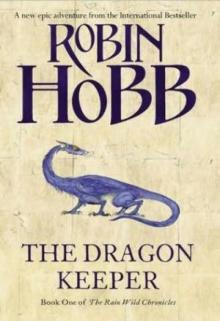 The Dragon Keeper trwc-1
The Dragon Keeper trwc-1 The Triumph
The Triumph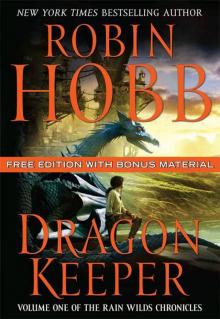 Dragon Keeper Free Edition with Bonus Material
Dragon Keeper Free Edition with Bonus Material Mad Ship tlt-2
Mad Ship tlt-2 The Inheritance and Other Stories
The Inheritance and Other Stories Tawny Man 02 - Golden Fool
Tawny Man 02 - Golden Fool Farseer 2 - Royal Assassin
Farseer 2 - Royal Assassin Rain Wilds Chronicles
Rain Wilds Chronicles Forest Mage ss-2
Forest Mage ss-2 Ship of Magic lt-1
Ship of Magic lt-1 Renegade's Magic ss-3
Renegade's Magic ss-3